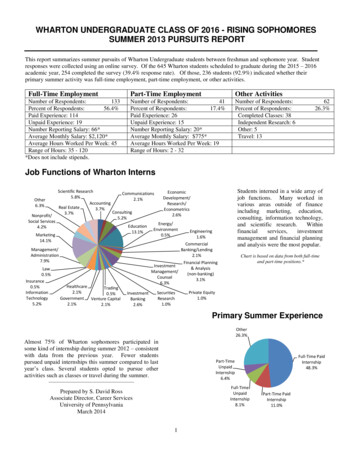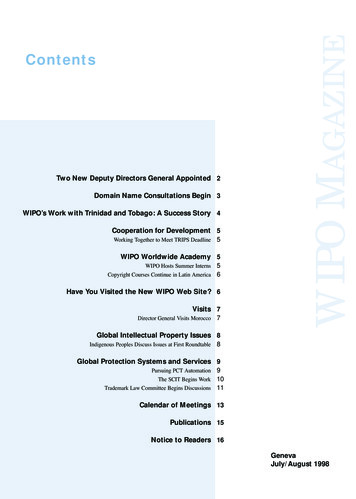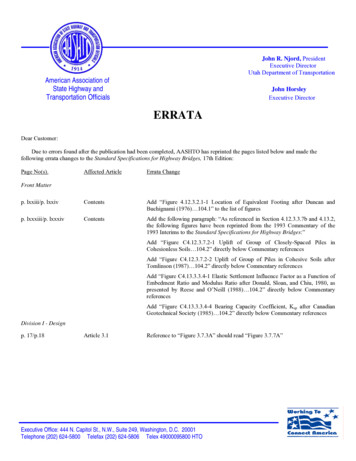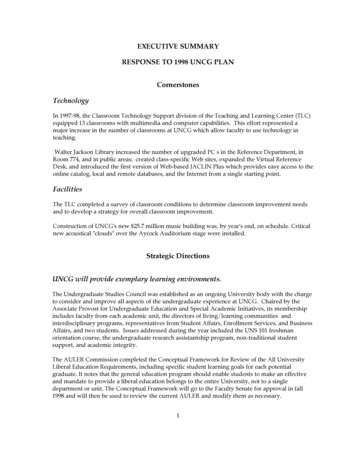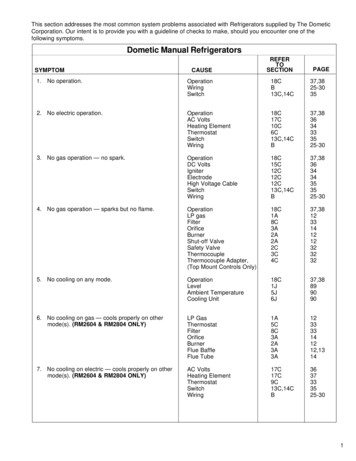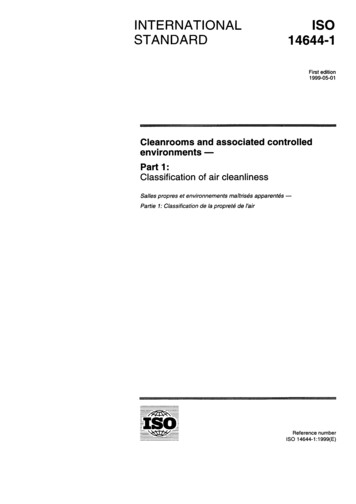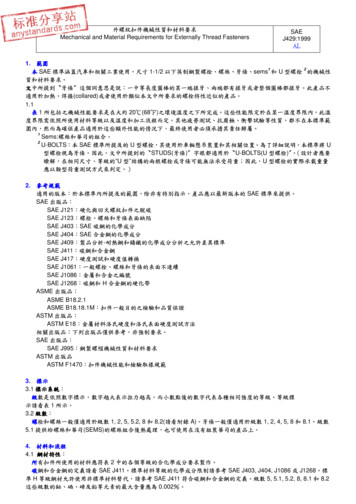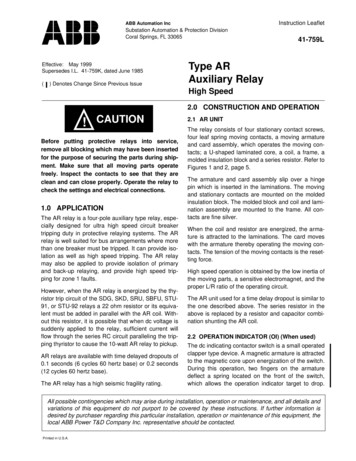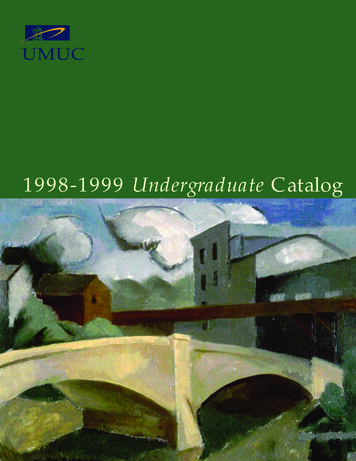
Transcription
UMUC1998-1999 Undergraduate Catalog
Undergraduate ProgramsUn i v e r s i t y of Ma r y l a n d Un i v e r s i t y Co l l e g eUMUCUniversity Boulevard at Adelphi Road, College Park, MD 20742-1660World Wide Web: www.umuc.edu/ugpE-mail: UMUCINFO@nova.umuc.eduUniversity Policy StatementsThe provisions of this publication are not to be regarded as an irrevocable contractbetween the student and University of Maryland University College. There areoccasional changes in the general regulations and in the academic requirements.Procedures that have been established for making changes were designed to protectthe institution’s integrity and each student’s interests and welfare. When a curriculum requirement or a graduation requirement is altered, it is made retroactive onlyif it is to the student’s advantage and can be accommodated within the span ofyears normally required for graduation.AccreditationUniversity of Maryland University College is accredited by the Commissionon Higher Education of the Middle States Association of Colleges and Schools,3624 Market Street, Philadelphia, PA 19104 (215-662-5606).NondiscriminationUniversity of Maryland University College welcomes applications from prospectivestudents and employees regardless of race, religion, color, creed, gender, maritalstatus, age, national origin, political affiliation, mental or physical disability, orsexual orientation.University of Maryland University College is a member of the University Systemof Maryland.
Table of Contents176176TutoringAlumni Association2INTRODUCTION TO UMUC24History and ScopeSpecial Features and Programs9ADMISSION AND ENROLLMENT910Admission RequirementsProcedures for Admission13BACHELOR’S DEGREE REQUIREMENTS131314ExpectationsRequirementsSecond Bachelor’s Degree15UNDERGRADUATE CURRICULA1831841516Primary and Secondary SpecializationsSpecialization Descriptions185 OTHER SUPPORTING PROGRAMS46ASSOCIATE’S DEGREES AND CER TIFICATES4646Associate of Arts DegreeCertificate Programs47ALTERNATIVE OPTIONS FOR EARNINGCREDIT187 INTERNATIONAL PROGRAMS4748Learning Gained Through ExperienceExternal Sources of College Credit18819119351INFORMATION ON COURSES51515152The Unit of CreditPrerequisitesKey to Course DescriptionsIndex to Course Descriptions176 FINANCIAL INFORMATION176177178181Tuition and FeesEmployer-Provided Tuition AssistanceFinancial AidVeterans’ Benefits182 GRADUATE PROGRAMS183 NONCREDIT PROGRAMS185186186186186National Leadership InstituteProfessional DevelopmentOffice of Instructional DevelopmentInstitute for Research on Adults in Higher EducationInstitute for Environmental ManagementInstitute for Global ManagementArts ProgramEuropean DivisionAsian DivisionPDP International194 ADMINISTRATION194194University System of MarylandUMUC198 FACULTY53UNDERGRADUATE COURSES225 APPENDICES167 ACADEMIC AND ADMINISTRATIVEREQUIREMENTS167170172Scholastic and Administrative StandardsResponsibilities of the StudentResponsibilities of UMUC173 SER VICES TO STUDENTS173173173174175General Information and OrientationTeam-Based Services to StudentsAdvising Assistance from Admission to GraduationOther ServicesLibrary Services237 INDEX242 MAPS244 APPLICATION FOR ADMISSIONInside Back CoverACADEMIC CALENDARTable of Contents1
Introduction to Universityof Maryland University CollegeUniversity of Maryland University College is one of 11 degree-granting institutions in the University System of Maryland. For more than 50 years, it has fulfilledits principal mission: to serve adult, part-time students through high-quality educational opportunities. UMUC offers a complete range of educational servicesboth in the traditional classroom and through contemporary distance learningformats. Classroom sites can be found throughout Maryland and in the Washington, D.C., metropolitan area, and in hundreds of locations overseas. Students alsocan “attend class” at a distance from anywhere in the world that can be connectedelectronically—even from places as remote as Antarctica.UMUC is an important partner in Maryland’s economic development. Adheringto its mission of bringing convenient and relevant learning opportunities to theworkforce, it has developed strong relationships with many prominent Marylandbusinesses to assure that their education and training needs, and those of theirindividual employees, will be met.UMUC conducts postsecondary programs for military servicemembers, U.S.government employees, and their families through its Asian and European Divisions. A two-year residential campus in Mannheim, Germany, serves the familymembers of U.S. military and government personnel stationed in Europe.At its residential campus at Schwäbisch Gmünd, Germany, UMUC provides aninternational undergraduate education to students from the United States anddozens of other countries. Russian students may earn a UMUC bachelor’s degreethrough programs offered jointly at Far Eastern State University in Vladivostokand Irkutsk State University in Irkutsk. Most recently, UMUC has begun offeringprograms in Uruguay. More information about programs in other countries maybe found in the International Programs section of this catalog.UMUC is unlike any other institution of higher education in the world. It ispreeminent in the offering of higher educational opportunities for adults in theUnited States and yet is also an international university. In fall 1997, UMUCenrolled nearly 35,000 students worldwide; annually, it serves about 75,000students. More than 5,000 academic degrees were awarded in the past year. Everyyear, UMUC holds commencement ceremonies in College Park, Heidelberg,Tokyo, Okinawa, Seoul, Schwäbisch Gmünd, Irkutsk, and Vladivostok.HISTORY AND SCOPEWhen the University of Maryland was reorganized in 1970, UMUC was designated as a separately accredited institution, an acknowledgment of the significanceof its programs for adult learners. Since then, UMUC has expanded its regionaland international programs and implemented a variety of innovative technologiesto keep pace with its students’ needs.2
The System now consists of11 degree-granting institutions:Bowie State UniversityCoppin State CollegeFrostburg State UniversitySalisbury State UniversityTowson UniversityUniversity of BaltimoreUniversity of Maryland, BaltimoreUniversity of Maryland,Baltimore CountyHigher education in Maryland was reorganized further in 1988, when the fiveinstitutions composing the University of Maryland joined with six other publiccolleges and universities to form the University System of Maryland. The Systemnow consists of 11 degree-granting institutions—Bowie State University;Coppin State College; Frostburg State University; Salisbury State University;Towson University; University of Baltimore; University of Maryland, Baltimore;University of Maryland, Baltimore County; University of Maryland, College Park;University of Maryland Eastern Shore; and University of Maryland UniversityCollege—and two research and service units, University of Maryland Biotechnology Institute and University of Maryland Center for Environmental Science.UMUC cooperates with its sister institutions to extend educational opportunitiesthroughout Maryland, administering the University System of Maryland ShadyGrove Center in Montgomery County and UMUC centers in Annapolis andWaldorf. UMUC also conducts classes at more than 20 additional sites in theregion and offers popular distance learning courses, using online instruction andother methods, in Maryland and around the globe.University of Maryland, College ParkUniversity of Maryland Eastern ShoreUniversity of MarylandUniversity CollegeIn addition to these 11 institutions,there are two University System ofMaryland research and service units:University of MarylandBiotechnology InstituteUniversity of Maryland Centerfor Environmental ScienceUMUC is known for its commitment to excellence in both credit and noncreditprograms. Undergraduate degree students may choose a primary specializationfrom among 30 academic subjects and may take advantage of UMUC’s innovativeapproaches to learning, such as distance education, interdisciplinary programs,cooperative education, and documentation of experiential learning. The universitymakes every effort to accommodate the undergraduate transfer student. TheGraduate School of Management & Technology confers master’s degrees in eightareas of management and technology. The Graduate School also offers ExecutiveMaster of Science in Management, Executive Master of International Management, and Executive Master of Science in Technology Management degrees, andan Executive Program in Information Technology leading to an M.S. in ComputerSystems Management or an M.S. in Telecommunications Management. Thecurricula of UMUC’s bachelor’s and master’s degree programs emphasize skillsand competencies needed by adults in the workforce. UMUC works closely withbusinesses and other organizations in developing and maintaining the currencyof these curricula.UMUC’s close partnership with the employer community also is evident throughthe work of its Professional Development unit and its National LeadershipInstitute (NLI). In coordination with the undergraduate and graduate schools,Professional Development customizes training and education for a wide array oforganizational clients. For 14 years, Professional Development has conducted anuclear science and engineering bachelor’s degree specialization designed forreactor operators at sites around the United States. NLI is devoted to the enhancement of leadership, offering a variety of programs and services and hosting abiennial conference on leadership. NLI’s flagship is the popular weeklong Leadership Development Program, conducted in affiliation with the North Carolina–based Center for Creative Leadership.3
UMUC enhances its programs with an array of support services tailored for adultstudents, such as academic advising, tutoring, career planning, and well-equippedcomputer labs. Many of these services are available online via the World Wide Webat www.umuc.edu/studserv/studserv.html. The Office of Instructional Developmentprovides expertise to support the use of computer-based video and interactiveinstructional methods and materials for adult students.UMUC’s headquarters are in College Park, Maryland, and include the Inn andConference Center, a popular residential facility where UMUC conducts educational conferences and adult learning programs that draw participants from aroundthe world. The center also houses a large collection of the work of Marylandartists, which is on public display year-round.UMUC’s place at the forefront of higher education worldwide has inspired amotto that expresses the scope of this innovative institution: “The sun never setson the University of Maryland [University College].”SPECIAL FEATURES AND PROGRAMSDistance Learning FormatsUMUC affords students the opportunity to earn a bachelor’s degree in more than13 curricula through courses offered at a distance. These courses are designed forstudents who require scheduling flexibility or are unable to commute to classroomsites. In addition to print or Web-based materials, courses often include video- oraudiotapes. Most courses require interaction through computer conferencing or voicemail. Some are available with optional discussion sessions.UMUC offers primary specializations in accounting, behavioral and socialsciences, business and management, communication studies, computer andinformation science, computer studies, English, fire science, humanities,management, management studies, paralegal studies, and technology andmanagement through distance education formats. Students may complete degreesexclusively online in the following specializations: accounting, behavioral andsocial sciences, business and management, computer and information science,computer studies, fire science, management, management studies, and technologyand management. For most specializations, students may choose to pursue theirdegrees through a combination of interactive formats. Distance courses can also beused to earn a paralegal studies document, complete a second bachelor’s degree, orsupplement classroom-based degree programs.For more details, students may visit the UMUC distance education Web site atwww.umuc.edu/distance or call 301-985-7000 or 800-283-6832.4
Bachelor’s Degree-at-a-DistanceUMUC’s award-winning distance education program, Bachelor’s Degree-at-a-Distance,brings educational opportunities to students throughout the world. Bachelor’s Degreeat-a-Distance is a flexible academic program that allows students in Maryland and allover the world to complete Bachelor of Arts or Bachelor of Science degrees usinginnovative technologies in an independent learning environment.Bachelor’s Degree-at-a-Distance offers the same degree-completion programs as listedon the previous page.For more details, students may request a copy of the current Bachelor’s Degree-at-aDistance Annual Planner by calling 800-283-6832 or visiting the Web site atwww.umuc.edu/bdaad.Bachelor's Degree-at-a-Distance for Students Living Outside the 50 StatesStudents living outside the United States are eligible to enroll in all Bachelor’sDegree-at-a-Distance courses offered online. A permanent e-mail address isrequired, and students should plan to use e-mail as their primary means ofcommunication with UMUC. In addition, for courses offered over the WorldWide Web, students are required to have an Internet service provider and a 486 orhigher computer. Windows 95 and the Netscape 4.01 (or higher) browser arerecommended. With Windows 3.1, Netscape 4.01 or higher is required. Detailsabout admission requirements for international students are found on p. 10.Online courses are available in the following specializations: accounting, behavioral and social sciences, business and management, communication studies,computer and information science, computer studies, English, fire science,humanities, information systems management, management, management studies,paralegal studies, and technology and management. In addition, many supportingcourses needed to complete a bachelor’s degree are available via the Web.Internationally located students may visit the Web site at www.umuc.edu/bdaad formore details.National Universities Degree ConsortiumUMUC participates in the National Universities Degree Consortium (NUDC).NUDC is a consortium of more than 13 accredited universities across the UnitedStates working together to offer more than 1,000 courses through distanceeducation. Courses are available directly from the individual members of NUDC.To receive a catalog, call 800-283-6832, ext. 7000, or visit the Web site atwww.sc.edu/deis/NUDC/.Prior LearningThe Prior Learning office offers students two means of obtaining credit forprevious study or for prior experiences beyond the classroom. One approach,the course-challenge examination, permits students to take comprehensive testson material learned outside the classroom that is generally presented in collegecourses. A test is prepared individually for the student who requests it. The other5
approach, EXCEL Through Experiential Learning, allows students to earn creditfor college-level knowledge acquired in work and life experiences. After beingadmitted to the EXCEL program, students enroll in a course that requires them toprepare a portfolio of relevant learning. The portfolio is evaluated by facultyspecialists for possible credit. This course is also offered in a distance educationformat. This credit may be applied toward a first or second degree. To be eligible,students must complete an EXCEL application and attend an EXCEL orientation.Students may call 301-985-7755 or visit the Web site at www.umuc.edu/prog/ugp/prior.html for more information.Cooperative EducationCooperative Education (Co-op) is an opportunity to combine academic theorywith practical, career-related experience. Students can earn upper-level academiccredit integral to the bachelor’s degree for new learning that occurs in the workplace. Co-op enables a student to develop new marketable skills while accumulating work experience in a professional position directly related to that student’sparticular curriculum at UMUC. It is possible for students to earn Co-op credit iftheir current position offers an opportunity for new learning or if they recentlystarted a new job, received a promotion, or were assigned new responsibilities.Co-op positions may be paid or unpaid, part time or full time, but must relate tothe student’s field of study.The Co-op staff is available to teach job-search skills and to help students findsuitable positions in various career fields. There is a fee for this service. Studentsseeking job placement do not officially enroll in Co-op until appropriate positionshave been found for them. Students may call 301-985-7780, send e-mail tocoop@www.umuc.edu, or visit the Web site at www.umuc.edu/prog/ugp/coop.html forfurther information.Special ProgramsNuclear science and engineering, environmental and hazardous materials management, environmental radiation protection, and health physics specializations areavailable through contracting arrangements and are delivered on site at participating corporations. The Office of Special Programs may be reached by calling301-985-7881 or (from outside the Washington, D.C., metropolitan area)800-444-6853.Nuclear Science and Engineering Program (NSEP)NSEP is the largest nuclear science bachelor’s degree program in the country. Itsobjective is to produce graduates who can effectively manage the technologicallyunique environment of the nuclear industry. It was designed to meet the recommended guidelines of the U.S. Nuclear Regulatory Commission.NSEP is a computer-aided program that is delivered on site at participatingcorporations, complete with faculty lectures, student services, and labs. Studentshave continual communication with faculty, academic counselors, and administrative staff through the use of telecommunications.6
Environmental and Hazardous Materials Management (EHMM)EHMM is designed to produce graduates with extensive technical expertise andscientific knowledge in the environmental field. Graduates are capable of dealingwith the entire life cycle of hazardous materials within the intricate legislative andregulatory scenario common to the field.Environmental Radiation Protection (ENRP) and Health Physics (HPHS)The ENRP and HPHS specializations allow graduates to perform radiationprotection functions, manage radiation protection programs, and respond tochanging radiation protection needs. Management courses are included so thatstudents are prepared to effectively assume increased management responsibilities.Community College AlliancesUMUC has partnerships with several area community colleges to allow adult, parttime students to move seamlessly into a bachelor’s degree program within theircommunities, through integrated curricula. Students may be dually admitted totheir local community college and UMUC through a single application, and maytake advantage of any of UMUC’s locations for their upper-level coursework.Students may also complete upper-level coursework through UMUC’s distancelearning options, including online conferencing. Counselors both at UMUC andthe community college provide academic advising, financial aid coordination, andlibrary services information.More academic alliances are currently in the planning stages.CCCC–UMUC AllianceIn Southern Maryland, Charles County Community College and University ofMaryland University College have formed the CCCC–UMUC Alliance. Thenewly opened CCCC–UMUC Waldorf Center offers students a state-of-the-arteducation facility. Instructional technology (including computer labs), instructional television, interactive video, and distance learning capabilities support theacademic programs of both institutions. Coordinated student and academicservices are available at the Waldorf Center. Students also may be admitted to theallia
Jun 11, 2009 · University of Maryland University College is one of 11 degree-granting institu- . the work of its Professional Development unit and its National Leadership Institute (NLI). In coordination with the undergraduate and graduate schools, . social sciences, b
